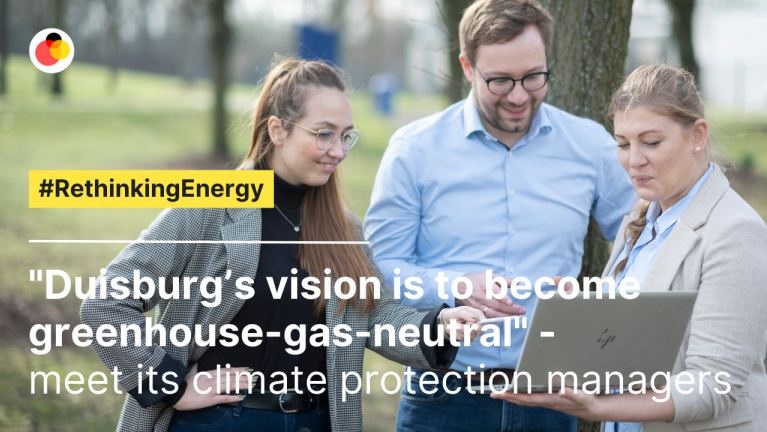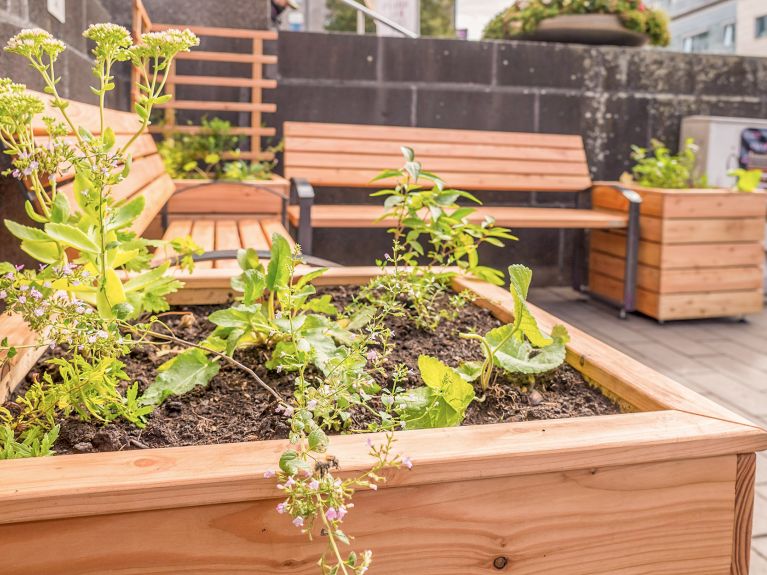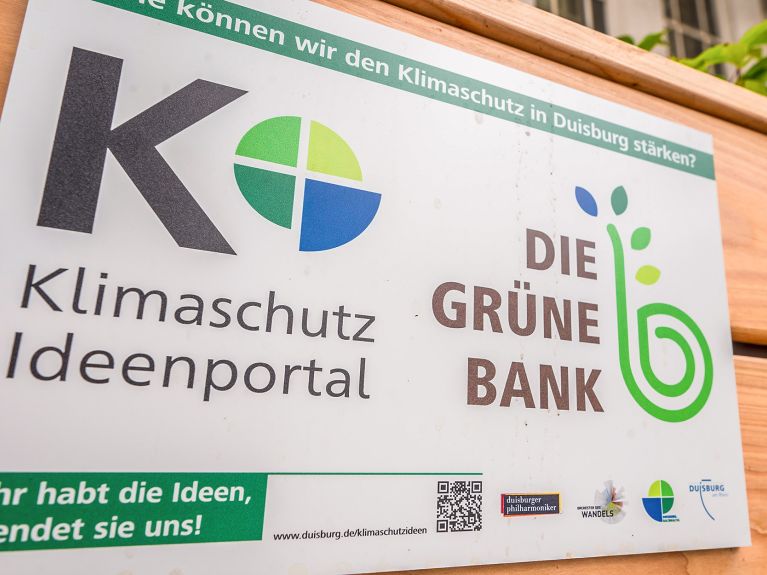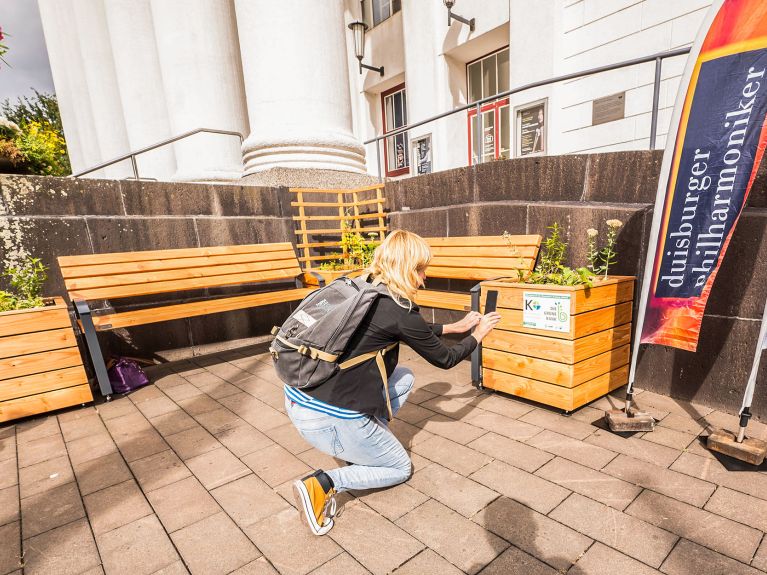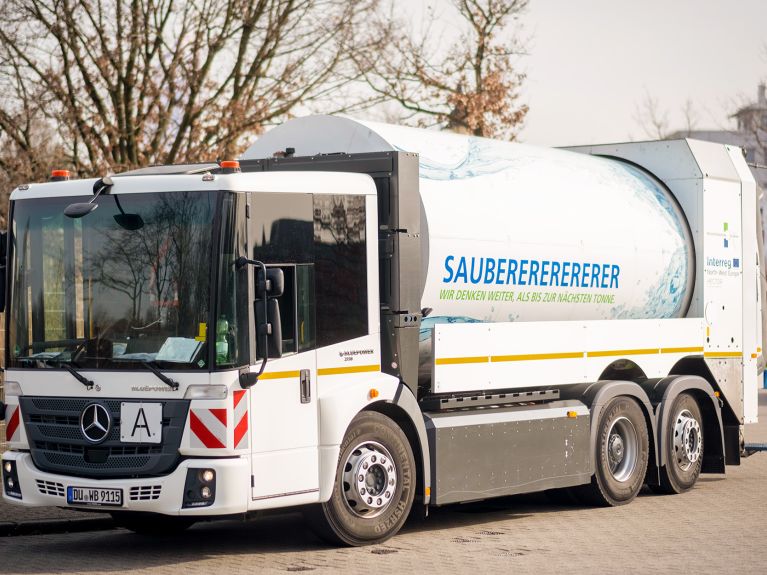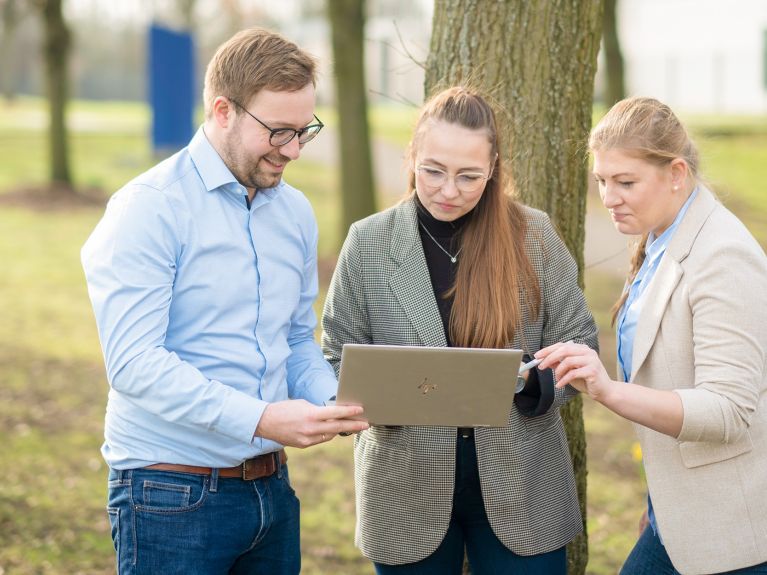The green transition in the city of steel
500,000 people in a confined space – Duisburg’s climate protection managers have a big job on their hands: after all, cities are crucial when it comes to the energy transformation.
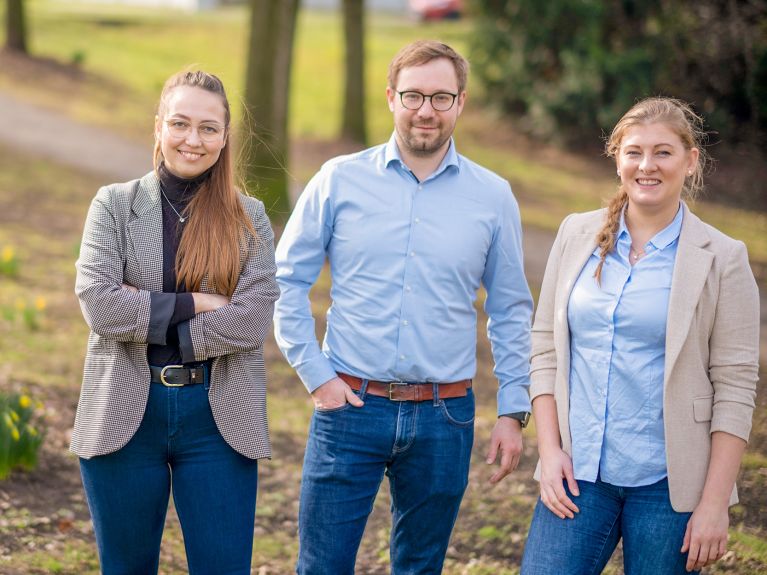
People who want to contribute to the energy transformation in response to the climate crisis: we introduce individuals whose ideals and commitment are driving the expansion of renewable energies in Germany and around the world.
From the 14th floor of the high-rise building where Melissa Metzner, Thomas Schmidt and Sarah Sticksel have their offices, you look out over a huge patch of wasteland near the city centre. The “Duisburg Dunes” – that’s the name of the new construction project currently being planned here. It’s a rather extravagant title for a piece of land between a motorway and a railway line, especially given the fact that the nearest body of water is a former industrial harbour. But the conversion of the former goods station into a green park residential estate is also a symbol of the change the city is currently going through – a process that Metzner, Schmidt and Sticksel are helping to shape.
Climate protection management for more green in the city
Together with another colleague and their team leader the three are assigned to Duisburg's climate protection unit and responsible for climate protection management in the city. They make sure that climate protection is considered in connection with construction projects such as the “Duisburg Dunes”, for example, ensuring there are sufficient green spaces and that corridors of fresh air are maintained. “Our job is make sure that climate protection is not just an ‘add-on’ but has to be taken into account in all projects,” says Sarah Sticksel, who also initiates her own climate protection projects together with her colleagues – “often with partners such as the municipal utilities, citizens’ initiatives or actors from the scientific community”. The basis for this is the climate protection concept adopted by the city council.
Dieses YouTube-Video kann in einem neuen Tab abgespielt werden
YouTube öffnenThird party content
We use YouTube to embed content that may collect data about your activity. Please review the details and accept the service to see this content.
Open consent formBut how do you become a climate protection manager? Since the job description is relatively new, there is no predefined training path, so the members of the Duisburg team come from diverse backgrounds: Sarah Sticksel has a degree in geography, Melissa Metzner holds a master’s in sustainable development management and Thomas Schmidt studied environmental systems and sustainability. Sticksel and Metzner came straight from university, while Schmidt previously worked in administration for a logistics company and a large consulting firm before taking on his current job. “Working for the city authorities, you’re really close to the action,” he says. “And you work on a completely different time scale since you’re setting the course for the coming decades.”
Climate neutrality at the municipal level by 2045
The climate protection team was set up two years ago and the positions are funded by the Federal Government’s National Climate Initiative (NKI). The aim is to contribute to Germany achieving its target of being largely climate-neutral by 2045. This is something they’re working in Duisburg, too – and there’s a lot to do. With a population of around 500,000, the city is located in the Ruhr area, a former coal and steel region in North Rhine-Westphalia. The last coal mine in the city closed in 2008, but Duisburg is still Europe’s largest steel-producing location.
It’s not just the ecological aspects that are important to us but the social aspects, too.
The energy-intensive production of steel is reflected in the city’s carbon footprint: About 3.5 percent of Germany’s CO2 emissions are produced in Duisburg. Closing the steelworks is not an option, says Melissa Metzner: after all they’re a crucial economic factor and employer in the region. “As climate protection managers, it’s not just the ecological aspects that are important to us but the social aspects of the transformation, too.” ThyssenKrupp, operator of the largest steelworks in the city, is looking to gradually switch its energy supply to green hydrogen over the next few years. The vision is green steel, made in Duisburg.
Green hydrogen is hugely important for the city.
Green hydrogen is “hugely important” for the city too, says Thomas Schmidt: this is because it is particularly well suited for running heavy commercial vehicles such as refuse collection trucks. Three such hydrogen-powered vehicles already in operation in Duisburg, and the waste management company’s entire fleet is to be converted by 2030.
Expansion of renewable energy with solar energy and geothermal energy
Other renewable energy sources also offer potential for Duisburg, says Sarah Sticksel. “There are lots of built-up areas here, so a classic wind farm is out of the question of course, but we do have expansive roof areas we can use for solar energy.” Duisburg also has experience of another climate-friendly energy source: a vocational school centre in the city centre is heated and cooled by geothermal energy. A feasibility study is currently underway to explore the extent to which the city’s subsoil might be suitable for deep geothermal energy, too. The aim is to find out more about the geological conditions by drilling test holes. Sarah Sticksel is very positive: “Cities can make a major contribution to the energy transformation.”
They say the fight against climate change will be won or lost in the cities.
The Duisburg climate protection team is keen to get citizens on their side. One way it is trying to do this is by setting up so-called “green benches” in the city – seats with plant boxes. The idea is to create places where people can talk to each other about the future of the city. Anyone interested can access the city’s climate protection ideas portal via a QR code attached to the benches and submit suggestions. “A 30 km/h speed limit in the entire city centre" is one idea, “making fallow land available to beekeepers until it is sold” or "greening the tram track beds” are others.
Lots of small steps – everything can make a big difference. “They say the fight against climate change will be won or lost in the cities,” says Melissa Metzner. “In a big city like Duisburg, there are lots of options available to us. Working on the energy transformation here feels very meaningful.”
